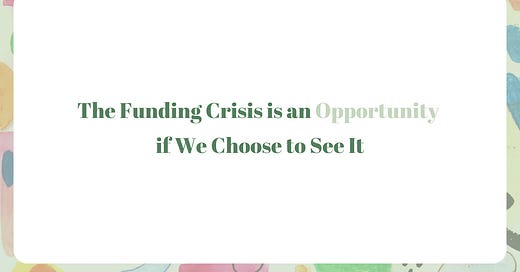When Trump came back into office in 2025, one of his first moves was to attack international human rights funding. His administration rolled out a series of executive orders that slashed U.S. support for gender justice, LGBTQI+ rights, and broader human rights initiatives around the world. Programs that activists spent decades building were abruptly frozen, defunded, or "reassessed" under the new nationalist agenda (Human Rights Watch, 2025).
But this is not just happening in the U.S.
Governments that were once seen as longterm allies in human rights spaces like the UK, Sweden, and the Netherlands, have been shifting their priorities for years, moving further away from the radical movements they once funded. In Sweden, the new right-wing coalition government announced in 2022 that it would cut development aid by nearly a billion Swedish crowns, with direct impacts on feminist and LGBTQI+ funding (Le monde, 2023). Meanwhile, private funders are following the same path. Open Society Foundations underwent a massive restructuring in 2023, pulling out of large parts of Europe and the Global South. In early 2024, Wellspring Philanthropic Fund announced it was shutting down its Human Rights and Dignity Program by 2026, signaling a complete move away from long-term human rights investments (Alliance magazine, 2024).
These shifts have left countless organizations scrambling for survival. These shifts have also exposed just how much we built our strategies on unstable ground.
Ever since I first entered social justice spaces, I remember how often activists, and particularly feminist activists, would talk about capitalism: how broken it was, how deeply it shaped everything around us, how our own movements were not immune to it.
We critiqued it in our panels, wrote about it in our manifestos, and warned about how dangerous it was to build futures inside a system that was designed to collapse.
And yet, while we were theorizing alternatives, we kept operating within the same capitalist logic: chasing funding cycles, writing endless project reports, stretching ourselves thin to meet donor expectations instead of movement needs. We survived on funding that was short-term, precarious, and unsustainable.
The same system we denounced was the one we depended on to keep going. We told ourselves we will benefit from it while we build alternatives.
But it was never about “benefiting”. It was about barely surviving. And it hollowed out our long-term visions in ways we’re only now fully confronting.
However, as scary and destabilizing as this moment is, I truly believe it’s offering us something we haven’t had in decades:
A real chance to start over!
For the first time in a long time, we are forced to ask the hard questions we kept postponing:
What do our movements really need to survive?
What would it look like to move beyond a project-to-project existence?
How do we build something that’s movement-centric, anti-capitalist, and built for the long haul?
Because let’s be honest! If our survival depends on the next executive order, the next election, the next boardroom decision from a billionaire-funded foundation, then we were never truly building power in the first place.
So let’s use this crisis as a portal; And through it, we have the responsibility and the opportunity to start doing the hard, messy work of building something else, something different, something new.
Coalitions over competition: actually sharing resources, strategies, and risks across movements instead of treating each other like competitors for scraps.
Mutual aid and solidarity funds: collective, community-driven funding models that prioritize relationships over paperwork.
Long-term visioning: refusing short-term deliverables in exchange for deep, slow, transformative change that is built by and from the communities it serves.
Trust-based organizing: centering trust, care, and collective leadership instead of donor-centric and imposed project plans.
As Adrienne Maree Brown reminds us:
"What we practice at the small scale sets the patterns for the whole system."
(Emergent Strategy, 2017)
It’s time to reimagine and practice something different.
It’s time to sit with the discomfort, to mourn what’s being lost, and also to dream fiercely and unapologetically about what can finally be built when the old systems fall away.
We’ve said for years that we wanted another world.
Maybe this is how it begins.




